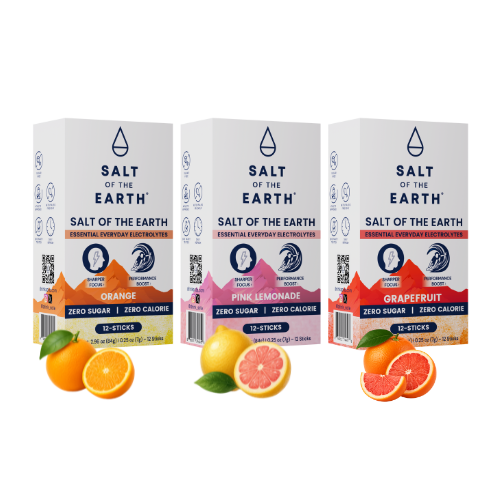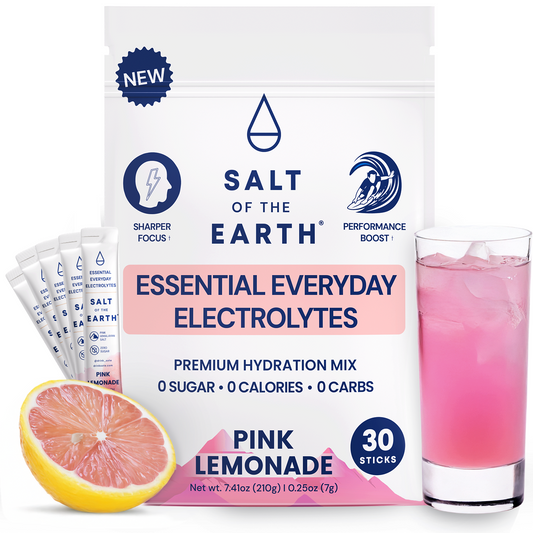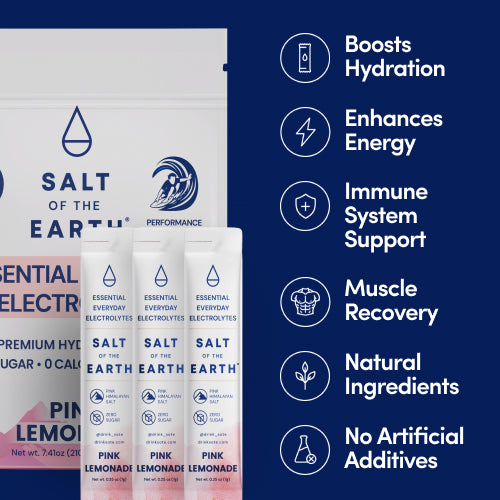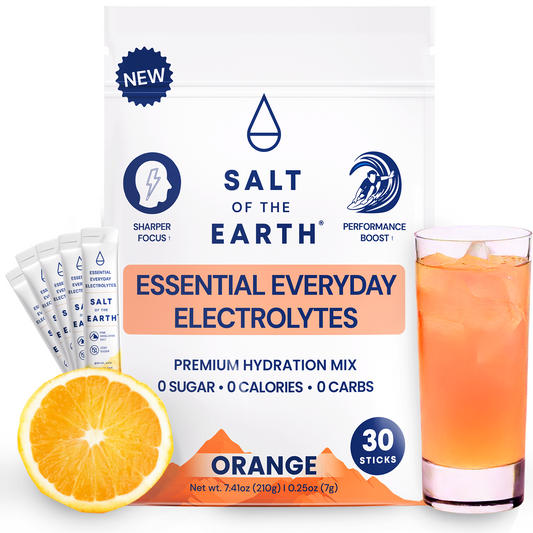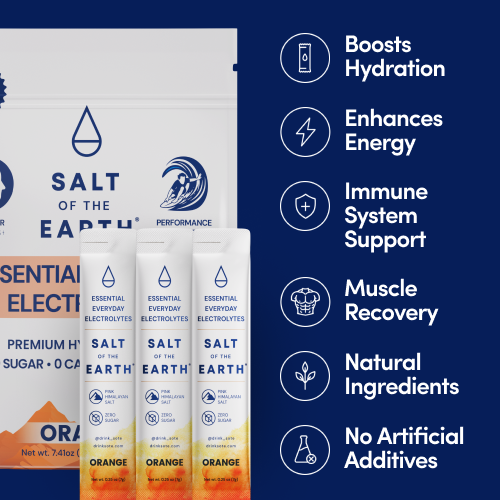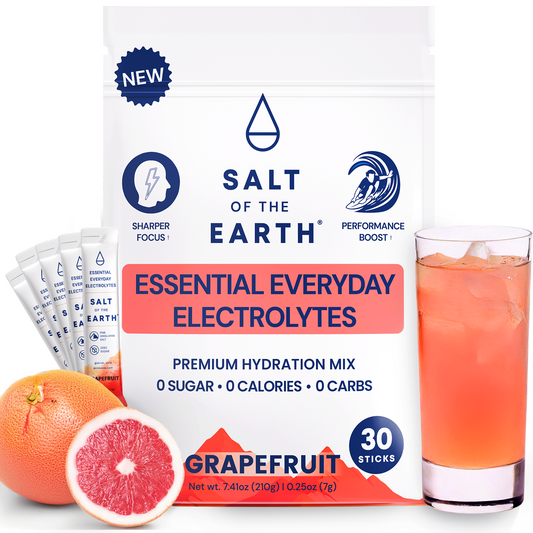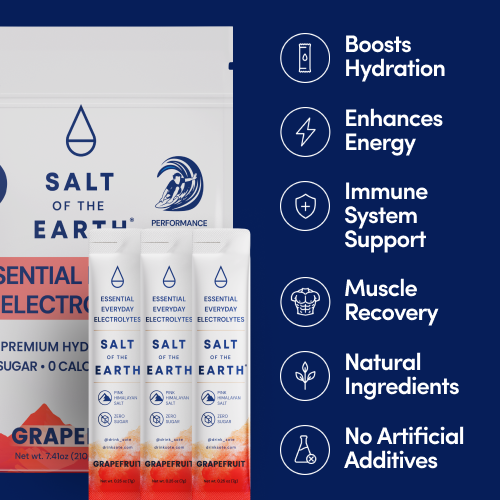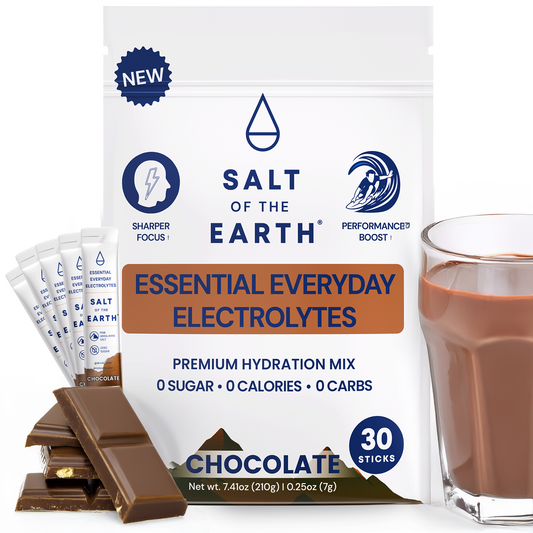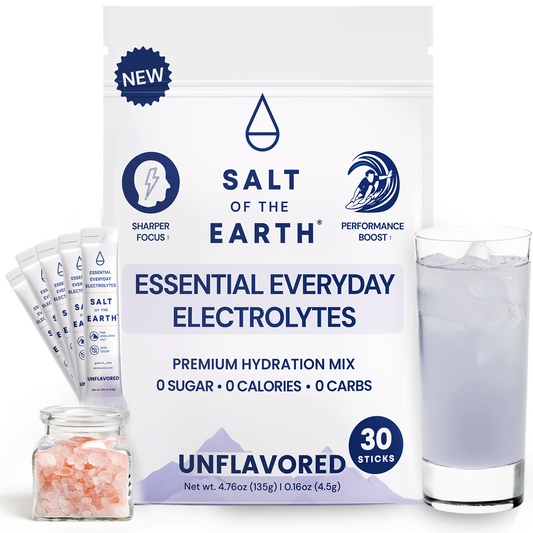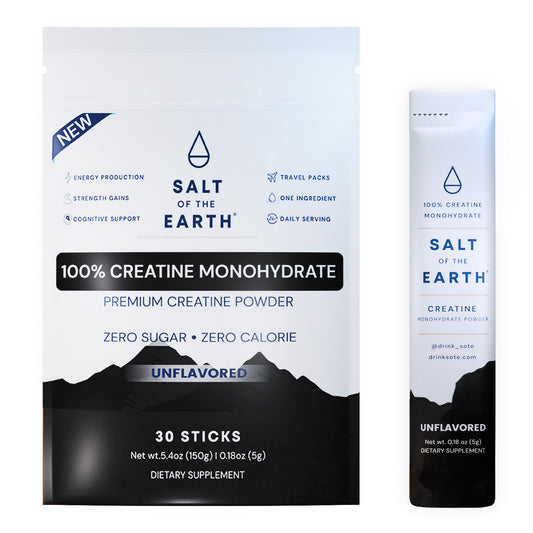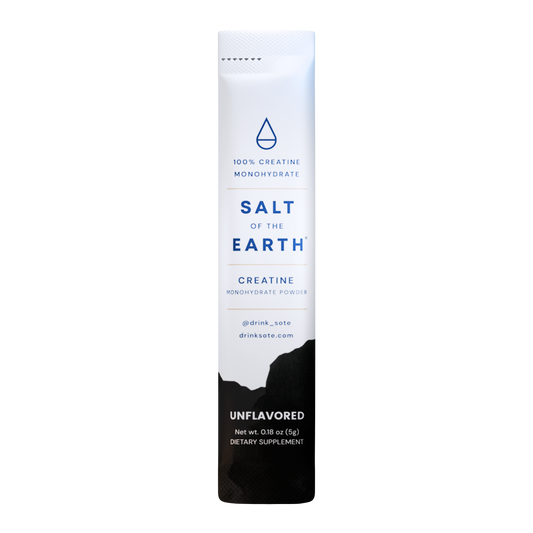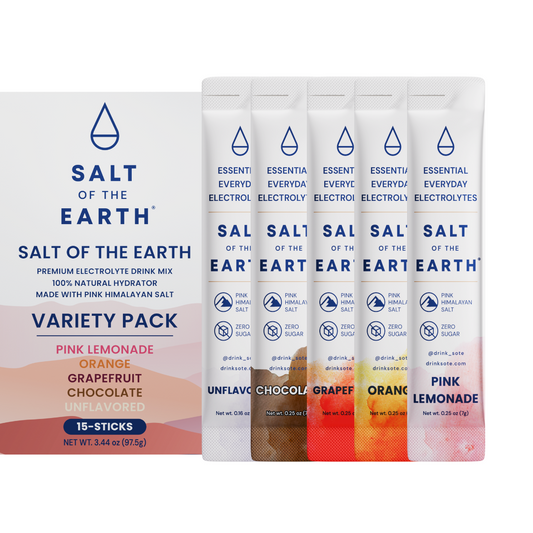-
Salt of the Earth | Natural Electrolytes | Citrus Power Pack
4.81 / 5.0
(26) 26 total reviews
Regular price From $59.97 USDRegular priceUnit price / per$59.97 USDSale price From $59.97 USD -
Salt of the Earth | Natural Electrolytes | Pink Lemonade
4.76 / 5.0
(704) 704 total reviews
Regular price From $7.99 USDRegular priceUnit price / per -
Salt of the Earth | Natural Electrolytes | Orange
4.76 / 5.0
(704) 704 total reviews
Regular price From $7.99 USDRegular priceUnit price / per -
Salt of the Earth | Natural Electrolytes | Grapefruit
4.76 / 5.0
(704) 704 total reviews
Regular price From $19.99 USDRegular priceUnit price / per -
Salt of the Earth | Natural Electrolytes | Chocolate
4.76 / 5.0
(704) 704 total reviews
Regular price From $19.99 USDRegular priceUnit price / per$19.99 USDSale price From $19.99 USD -
Salt of the Earth | Natural Electrolytes | Unflavored
4.76 / 5.0
(704) 704 total reviews
Regular price From $19.99 USDRegular priceUnit price / per -
Salt of the Earth Creatine Monohydrate
4.85 / 5.0
(26) 26 total reviews
Regular price $24.99 USDRegular priceUnit price / per -
PREORDER Variety Pack - 3 sticks of each flavor
4.4 / 5.0
(43) 43 total reviews
Regular price $19.99 USDRegular priceUnit price / per
This is the most satisfying drink any time of day and any desired temperature! It’s great when I need fluids and electrolytes first thing in the morning and during activities, great for taking my aminos in the morning, great for times in the afternoon and evening when I’m just wanting something and don’t want to eat, AND for any time i want hot chocolate or cool chocolate. Great balance among the flavors. And I chose it in the first place for its ingredients!
Superb product! I drink it every day!
Drink it everyday
Honest company. Easy to interact with.
Great flavor!! Light. Refreshing. Not too sweet 👌🏼
Sodium, the most important electrolyte
Sodium is responsible for driving water into your cells, if you don't have enough sodium in your water you won't get properly hydrated.
YOU NEED MORE SALT, NOT LESS.
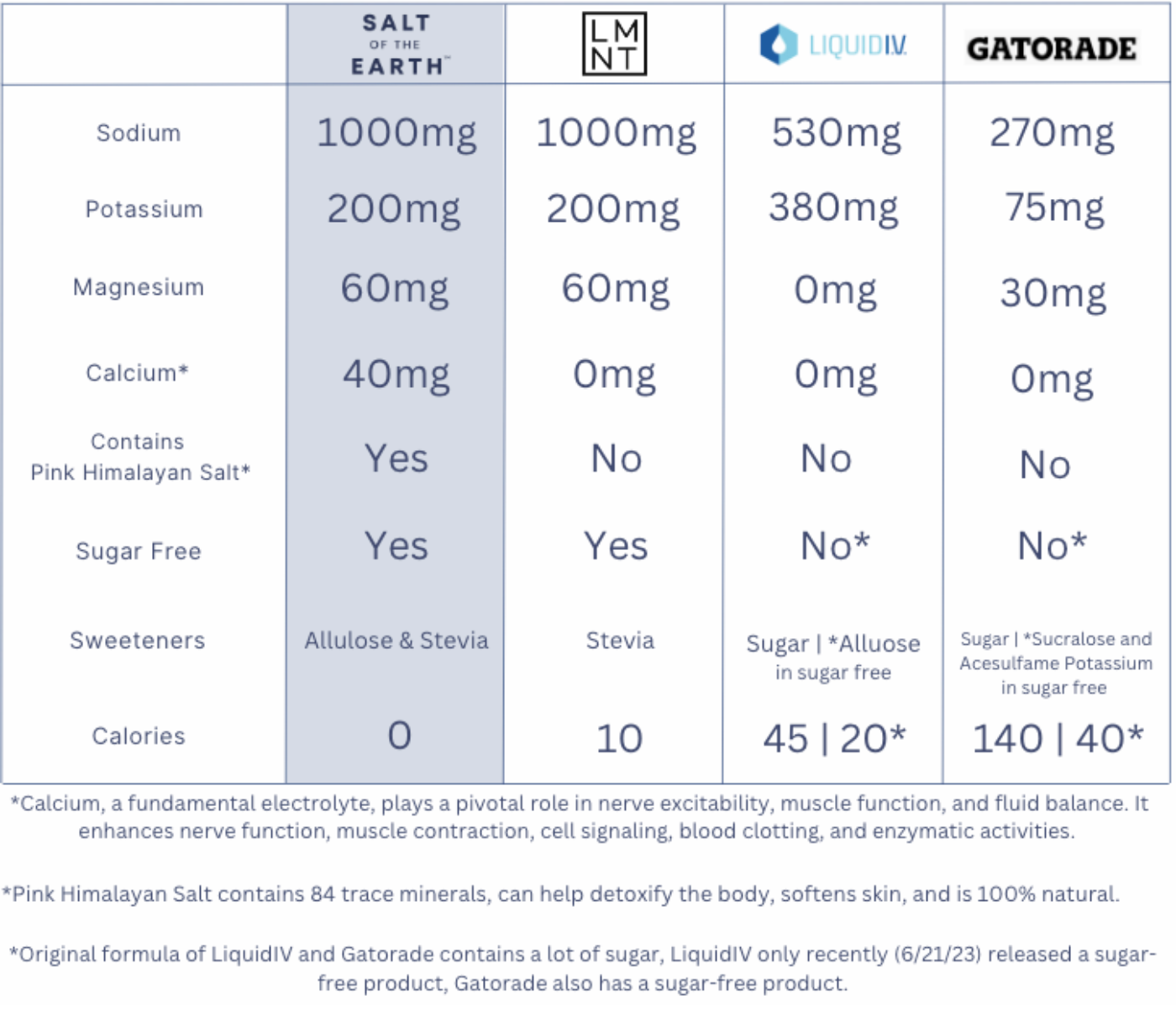
Compare us to the competition
We have a similar formula ratio as LMNT, but with calcium, better Salt, and we taste better
















Blog posts
View all-
Does Gatorade Have Magnesium?
Does Gatorade have magnesium? The truth might surprise you. While Gatorade is known for replenishing electrolytes like sodium and potassium, its classic formula lacks magnesium — a vital mineral for...
Does Gatorade Have Magnesium?
Does Gatorade have magnesium? The truth might surprise you. While Gatorade is known for replenishing electrolytes like sodium and potassium, its classic formula lacks magnesium — a vital mineral for...
-
Brain Fog at Work? Here’s How Dehydration Steal...
Brain fog at work is more than just feeling off—it’s a sign your brain is struggling. One major cause is dehydration from sleepless nights, which lowers vasopressin, the hormone that...
Brain Fog at Work? Here’s How Dehydration Steal...
Brain fog at work is more than just feeling off—it’s a sign your brain is struggling. One major cause is dehydration from sleepless nights, which lowers vasopressin, the hormone that...
-
Natural vs Synthetic Clothing: The Health Impact
Wrinkle-Free, But at What Cost? The Truth About Synthetic Clothing Many people turn to synthetics like polyester, acrylic, and spandex for convenience — wrinkle-free, durable, and stretchy fabrics that dominate...
Natural vs Synthetic Clothing: The Health Impact
Wrinkle-Free, But at What Cost? The Truth About Synthetic Clothing Many people turn to synthetics like polyester, acrylic, and spandex for convenience — wrinkle-free, durable, and stretchy fabrics that dominate...
FAQ
Isn't too much salt/sodium bad for you?
No. Salt is a superfood.
The latest research suggests 5,000-7,000mg of sodium. Which is equal to about 12.5g-17.5g of salt. 2.5-3.5 teaspoons of salt.
Also, Dr. James DiNicolantonio and Dr. Andrew Huberman's daily recommendation is at least 8-12 grams of salt, double the standard recommended Salt intake amount.
If you are dealing with prehypertension or already eating a lot of salt in your diet, this may not be your product.
What if I have high blood pressure?
Stage 1 hypertension is defined as blood pressure above 130/80 mm Hg, with some individuals experiencing elevated blood pressure that does not yet meet the criteria for hypertension. This information is relevant to both scenarios. As a general rule, the higher your blood pressure, the more cautious you should be.
Historically, much of the medical community has advocated for low salt diets, as sodium has been linked to increased blood pressure. Consequently, consuming products with higher sodium levels, like Salt of the Earth, may seem counterintuitive to those in the healthcare field.
However, perceptions are shifting. Just as the views on saturated fats, eggs, and butter have evolved, so too are opinions on salt. Emerging research and leading scientific voices are challenging the old paradigms, suggesting that the narrative around salt needs reconsideration. Some experts now argue that low salt diets could actually be detrimental, raising blood pressure instead of lowering it, adding to the complexity of the issue.
While we do not provide medical advice, here is a simplified interpretation based on insights from experts like Dr. Richard Johnson and others:
- Approximately 75% of the population is not salt-sensitive, meaning higher sodium intake does not necessarily elevate their blood pressure.
- Sodium consumed with adequate water—as is typical during hydration—may be safer than sodium consumed with food.
- When you exercise, you lose essential minerals like sodium, potassium, and magnesium, which need to be replenished regardless of blood pressure levels.
- Individuals on low-carb diets, those who practice intermittent fasting, or engage in regular exercise may require more electrolytes, particularly sodium. This includes those with higher blood pressure.
For those considering using Salt of the Earth, especially if you have higher blood pressure, here are some cautious guidelines:
- Reserve Salt of the Earth for exercise periods rather than as a daily beverage until you confirm it doesn't negatively affect your blood pressure.
- Dilute the product more than usual—suggesting one sachet per liter of water instead of the standard 750 ml.
- Divide one sachet into two 500 ml portions and consume only one portion per day.
- Sip slowly to moderate intake.
- Monitor your blood pressure regularly to observe any changes when using Salt of the Earth and compare it to non-usage days.
- Pay attention to how you feel overall.
- Manage your total daily sodium intake, particularly on days you consume Salt of the Earth.
Finally, research indicates that an optimal sodium intake might be around 5 grams per day, even for those at cardiovascular risk. This level is often not met by many, even with the inclusion of a product like Salt of the Earth, which contains 1 gram of sodium per sachet.
We hope this information helps you make informed decisions about using Salt of the Earth in a way that suits your health needs and lifestyle.
Is Salt of the Earth safe for pregnant women?
Hydration plays a critical role during pregnancy due to increased fluid and nutrient demands, as well as challenges like morning sickness.
Salt of the Earth is designed to be safe for use during a normal, healthy pregnancy, catering to both active and less active expectant mothers.
Our formulation is particularly suitable for pregnancy thanks to our balanced mineral content, absence of added sugars and chemicals, and our use of natural, unprocessed, unpolluted sodium.
Important Note: Salt of the Earth should not be used by individuals with kidney disease, hypertension, or those on diuretic medications. We also recommend consulting with a healthcare provider if you are experiencing conditions such as oedema (swelling), water retention, or preeclampsia during pregnancy.
Does Salt of the Earth break a fast?
Fasting protocols are nuanced and widely vary among individuals and communities. These protocols are not rigidly defined by scientific standards but are shaped by general consensus and traditional practices.
The majority of fasting enthusiasts agree on a few key principles: avoid any caloric intake, prevent any increase in blood sugar, and avert any insulin response during a fast. Based on these widely accepted criteria, Salt of the Earth is an excellent option for various styles of intermittent fasting, such as 16:8 or 12:6 schedules.
Some concerns arise around the use of ingredients like stevia and flavorings, which some believe may influence fasting negatively by signaling the brain in ways that contradict fasting goals. However, our stance at Salt of the Earth is that, similar to beverages like black coffee and green tea, our electrolyte solutions, especially the unflavored versions, do not disrupt the fasting state.
Additionally, bone broth is often recommended during fasting because, although it contains calories, its fat content helps manage hunger and it does not trigger a rise in blood sugar or insulin levels. It also supplies essential nutrients that can be beneficial during a fast.
For those following stricter fasting protocols, such as water-only fasting or autophagy-focused fasting, our recommendation is to opt for our flavored Salt of the Earth products outside of the fasting window.
For all types of fasting, our unflavored Salt of the Earth is appropriate and effective, ensuring that you maintain essential electrolyte balance without compromising the integrity of your fast. This makes it a versatile and supportive choice for anyone engaged in fasting practices.
Does Salt of the Earth cure hangovers?
The straightforward answer is that Salt of the Earth won't prevent or cure a hangover. Hangovers are complex and involve more than just dehydration, and despite claims from various products, there are no magical solutions.
However, dehydration significantly contributes to the miserable feelings associated with hangovers, and alcohol consumption results in notable losses of fluids, sodium, and magnesium. Salt of the Earth can significantly mitigate these effects, enhancing how you feel and perform the next day—a benefit many of our customers have experienced firsthand.
We recommend taking one stick in 12oz of water before going to bed, and another when you wake up if you're still feeling under the weather. Ideally, you should start hydrating with Salt of the Earth while you're drinking. The sooner you begin to hydrate, the better.
Following Dr. Andrew Huberman’s advice, a good rule of thumb is to consume two glasses of water with electrolytes for every alcoholic beverage.
Your body will appreciate this proactive approach to hydration.
What are the benefits of electrolytes?
Electrolytes are essential for maintaining hydration, especially during and after physical activity when the body loses fluids and minerals through sweat. Electrolytes help replenish the lost fluids and prevent dehydration, cramps, fatigue, and heat-related illnesses. Electrolytes also support normal muscle function, nerve transmission, blood pressure, and pH balance.
When and how much Salt of the Earth should I take?
The best hydration strategy depends on your lifestyle and activities. Here’s how you can incorporate Salt of the Earth into your routine:
Healthy Diets and Intermittent Fasting: Start your day by hydrating with Salt of the Earth right after waking up. Continue to sip throughout the day based on your activity level and how you feel. Generally, 1 - 2 sachets per day are sufficient.
Strict Water-Only Fasting: You can use our unflavored Salt of the Earth during your fasting period. However, opt for our flavored versions either before or after your fast. We recommend 1 - 2 sachets per day.
Religious Fasting: It’s crucial to stay hydrated before beginning your fast and after it ends. If your fasting guidelines allow, you can also hydrate with Salt of the Earth during the fast. Aim for 1 - 2 sachets per day.
Exercise Performance: Whether you’re gearing up for a workout or in the midst of one, Salt of the Earth can be integrated at any point. It’s especially critical to use during endurance activities to maintain hydration and prevent muscle cramps. Plan on one sachet every two hours of activity, plus one sachet post-activity for recovery.
Strength Training and HIIT Workouts: If you're engaging in workouts lasting less than two hours, feel free to drink Salt of the Earth during the session if it suits you. Many prefer plain water during intense workouts and use Salt of the Earth afterward to replenish and recover.
During Illness (e.g., Diarrhea or Vomiting): Hydrate gradually throughout your illness with Salt of the Earth to aid recovery.
Breastfeeding: Hydrating with 1 - 2 sachets per day can be beneficial.
Sauna Sessions: Use one sachet for every half hour spent in the sauna to ensure optimal hydration.
For specific hydration strategies, such as preloading for a race, click here to learn more about our performance protocol.
While a daily intake of up to 3 sachets is generally safe, during long endurance events like Ironman races or ultra-marathons, you may need more. Always listen to your body and adjust your hydration accordingly.
Who should use electrolytes?
Anyone who engages in moderate to intense exercise, especially in hot or humid conditions, can benefit from electrolyte products to prevent dehydration and enhance performance. Electrolyte products can also be helpful for people who have certain medical conditions that cause fluid loss, such as diarrhea, vomiting, fever, or kidney disease.
What are the Ingredients?
Pink Lemonade - Pink Himalayan Salt, Potassium Chloride, Magnesium Glycinate, Magnesium L-Threonate, Calcium Lactate, Malic Acid, Natural Flavor, Red Beet Powder, Allulose, Stevia Leaf Extract
Orange - Pink Himalayan Salt, Potassium Chloride, Magnesium Glycinate, Magnesium L-Threonate, Calcium Lactate, Malic Acid, Natural Flavor, Carotene, Allulose, Stevia Leaf Extract
Grapefruit - Pink Himalayan Salt, Potassium Chloride, Magnesium Glycinate, Magnesium L-Threonate, Calcium Lactate, Malic Acid, Natural Flavor, Grapefruit Powder, Natural Flavor, Allulose, Stevia Leaf Extract
Chocolate - Pink Himalayan Salt, Potassium Chloride, Magnesium Glycinate, Magnesium L-Threonate, Calcium Lactate, Cocoa Powder, Natural Flavor, Allulose, Stevia Leaf Extract
Unflavored - Pink Himalayan Salt, Potassium Chloride, Magnesium Glycinate, Magnesium L-Threonate, Calcium Lactate


